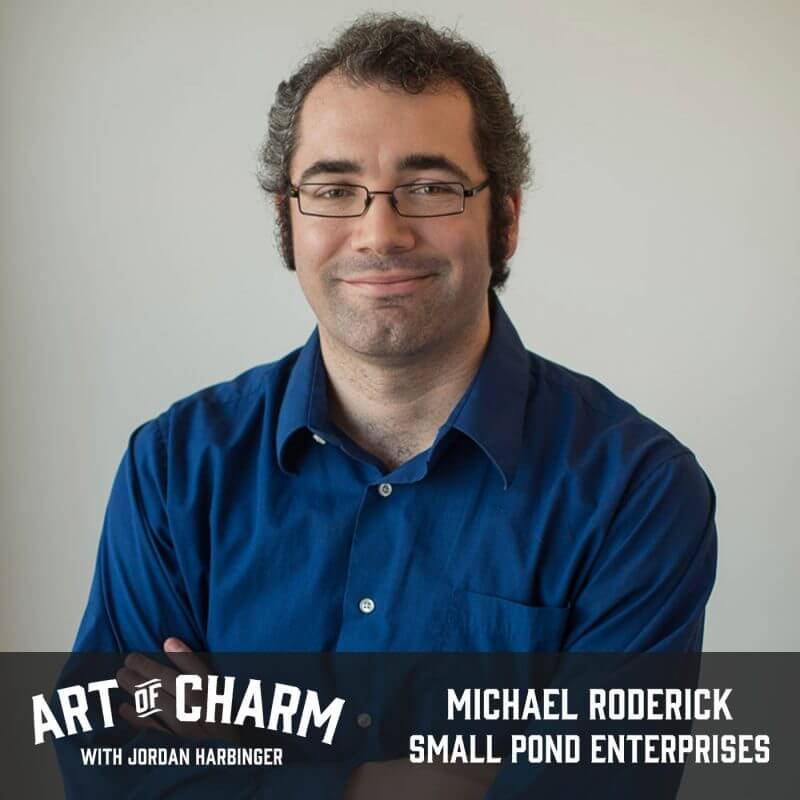Michael Roderick (@MichaelRoderick) went from being a high school teacher to a broadway producer in two years. Here, he shares what he’s learned about the different ways we connect and how they tie into our own issues around giving and asking.
The Cheat Sheet:
- You may understand the importance of creating a network, but do you understand the importance of curating that network?
- Are the people in your network as invested in your success as you are in theirs?
- Find out how to break your network down into four categories and discover who to focus your energy and time on.
- Understand the difference between framework and formula (and which is more effective).
- Learn the GATE strategy for creating a balance in your life around giving, asking, thanking, and experimenting.
- And so much more…
[aoc-subscribe]
We all know how important it is to “network,” but how many of us have practical ideas for unpacking that term? On episode 490 of The Art of Charm, we talk to Michael Roderick, a former high school teacher who became a broadway producer in two years. As someone who’s met over 5,000 people in one-on-one situations and raised money for Broadway shows, he’s going to distill down what he’s learned about connecting, how important it is to curate a network, and the spectrum of anxiety that surrounds giving and asking.
His company Small Pond Enterprises specializes in relationship design for founders, authors, and speakers interested in playing a bigger game. Michael is also the founder of ConnectorCon, a conference for connectors, as well as Relationship Adventure Day, an invite only-networking event combined with a scavenger hunt in NYC.
More About This Show
We talk a lot on The Art of Charm about how to create networks and why they’re valuable, but Michael Roderick of Small Pond Enterprises reminds us that it’s just as important to curate these networks we carefully assemble to ensure that their value remains constant.
“Curating your network and really thinking very carefully about who you bring into your life can help you…with friends and family as well as for business purposes,” says Michael. “A lot of the time we harp on what we put in our bodies, we harp on what technology we use, but when you ask the average person, ‘Do you really think about who you allow into your life and who do you really spend time with?’ very few people take the time to curate that or think about that.”
You can begin curating your network by asking yourself if the people in it are there because of proximity (maybe you were college roommates or you grew up in the same neighborhood), or are they there because of shared goals and interests? More simply put: Are the people in your network as invested in your success as you are in theirs?
While examining your existing network and separating those who are invested in your success from those who aren’t, the process can feel robotic and soul-sucking if you do it poorly. In his experience breaking into the insular world of Broadway, Michael found it easier to focus on the positive and let the negative work itself out by omission.
“I focused on other people’s success, but I focused on the right people,” says Michael. “I really thought very carefully about which producers did I believe in and thought were doing really great work, and I gave my help and support to those people. But I really took the time to make the decision of which of them I talked to, because there were some that, if I had done something like that, they just would have taken advantage of me — and they just would have been jerks, basically. I found the ones that really were the type where they were interested in mentoring, and they were interested in helping, and they saw me as somebody who could help them achieve their goals, but they also cared about where I was going and what I was doing.”
In screening for these right people, Michael says it’s a matter of taking the time to really research people and asking them things they never get asked — their interest tends to follow. Be specific. Instead of asking something vague and lifeless like, “I saw that you produced this show — what was that like?” try, “I saw that you worked on this project and I’m fascinated with the way that you figured out how to get these actors paid. Can you tell me a little bit more about that process and what you did?”
If they don’t show any interest back, this might be your cue to focus on drumming up interest elsewhere — and try not to take it personally. “In some cases, they’re just not interested in what I’m doing because I’m not where I need to be yet for them to pay attention to me,” says Michael. Once you start getting more attention than you know what to do with, you’ll understand the world from their perspective — you have to start saying no to some people or you’ll be overwhelmed and unable to focus on what’s important to you.
It’s also important not to get too caught up in keeping score when you’re curating your network — that is, expecting your generosity to be reciprocated in kind by those you share it with. If you’re giving out your time to people you consider worthwhile, you have to treat it as a gift and not a contractual obligation — otherwise, your generosity isn’t genuine.
And speaking of being genuine, Michael has this to add: “If you don’t really think that what they’re doing is valuable or helpful or you’re not excited about it, don’t say, ‘Oh, I’d love to learn more and get to know you better’ just because they have a large following…they’re going to find you out.”
This being said, let’s say you have been generous without the expectation of anything in return. And let’s say you are genuine in your interactions. After some time, it’s not unreasonable to reach out and ask for help from a connection in your network, but there’s a certain amount of anxiety around this act that cripples some of us — especially if we’re far into the giving side of the generosity spectrum. We may feel we’re putting someone out by asking a favor. At the same time, directly asking for a favor may be uncomfortable for both parties and evoke a defensive “flight” response from the person being asked.
So what’s the solution? How do you find the balance between hustling for something you want and seeking help in a way that’s not damaging to your carefully curated network relationships? Michael says there are four ways you can think about asking:
- The Direct Ask: The least effective ask — not ideal for reasons already mentioned.
- The Indirect Ask: This is what Michael considers the most effective ask, and he’s used it extensively for raising money for Broadway shows. You present a problem to somebody and ask them if they have any ideas for a solution — you give them the opportunity to be the hero. It’s up to them whether or not they want to help or support you, but as Michael says, “If you ask somebody if they have any ideas, very few people will say no.” Most people will come up with at least something — because who wants to go on the record as being someone who can’t think of good ideas?When he was raising money, Michael would simply present his problem in need of a solution like so: “I’m raising money for this show and I’m trying to think of the best people to talk to who do this kind of thing. Do you have any ideas?”This would get a variety of responses, from introductions to potential investors, introductions to other producers, “and in many cases,” says Michael, “I would say, ‘Listen, I know very little about this industry; I’m just learning. I would love to know whether or not you think this is a viable show?’ I would just ask them point blank, and they’d sit there and we’d talk about it, and in some cases they’d be like, ‘Yeah, I want to invest in this!'” Or, at the very least, it would lead to an introduction to someone who was ready to invest.”It changes the dynamic when you present people with…interesting problems,” says Michael.
- Mutually Beneficial Ask: This is when you ask in a way that benefits both parties. It involves a bit of research beforehand to find out what the other person values most, and then you present the ask as a solution to both of your problems.
- Extraordinary Ask: In this case, you’re actually asking yourself permission to seek something seemingly ludicrous from someone else. In the proper circumstances, taking the leap and being the one who dares to ask for something among a sea of contenders who won’t dare makes you stand out.
Listen to this episode of The Art of Charm in its entirety to uncover the dangers of keeping score when curating your network, understand frameworks vs. formulas, prioritize your focus as your network grows with Michael’s ABCD (Advocates, Boomerangs, Celebrities, Drains) model, identify networking archetypes (among sharks, dolphins, and the drowning), learn the GATE (Giving, Asking, Thanking, and Experimenting), and more.
THANKS, MICHAEL RODERICK!
Resources from this episode:
You’ll also like:
On your phone? Click here to write us a well-deserved iTunes review and help us outrank the riffraff!




